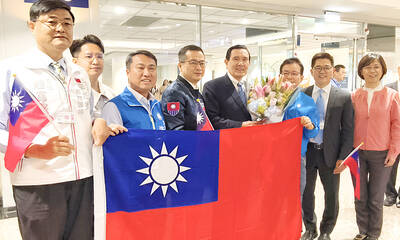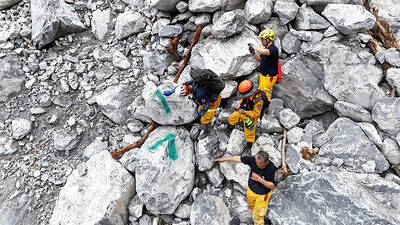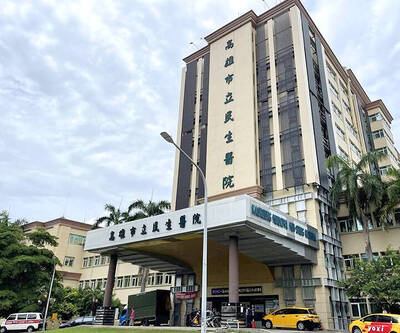The government should protect agricultural techniques and cultivars as “sensitive technology,” and punish people who export such technology abroad, Agricultural Bank of Taiwan chairman Wu Ming-ming (吳明敏) said yesterday.
After China on Friday last week abruptly announced that it would suspend imports of pineapples from Taiwan from Monday, Chinese state-run media began promoting pineapples grown in Guangdong Province, including the Taiwanese-developed Golden Diamond type.
Taiwan has precious semiconductor and agricultural techniques, but many of them are said to have been exported to China, Wu told a news conference in Taipei promoting pineapple exports.

Photo: Sam Yeh, AFP
Wu called on the government to take action to protect newly developed fruit cultivars to prevent them from flowing to China and to help to promote local products.
The plight of Taiwan’s pineapple growers is the result of an excessive reliance on China’s market, which accounts for more than 90 percent of exported pineapples, he said.
However, prices are not necessarily good when the quantity is large, he said.
Taiwan should not compete with other nations in terms of volume; instead, it should boost the image of local crops by promoting those with traceable certification logos, while diversifying export destinations, Wu said.
The bank in 2019 established a platform to coordinate supply and demand for agricultural products, as many visitors and Taiwanese businesspeople would ask where to buy Taiwanese fruit, he said.
The platform can be accessed at www.ansingo.com.tw.
Through the platform, Taiwanese in Australia have ordered 2 tonnes of pineapples and in Canada more than 10 tonnes, Wu said, adding that Taiwanese in Vietnam, which does not import fresh pineapples from Taiwan, are seeking ways to import processed pineapple products.
Taiwanese in New York are planning to invest in cooling logistics to enable the shipment of pineapples to the US, he said.
More than 60 pineapple-related products are available on the platform, ranging from fresh and dried pineapples, and pineapple cakes, to vinegar, popsicles and noodles made from the fruit, he said.
The platform also promotes local growers’ organic products, as they usually have difficulty selling them at good prices due to the higher costs of organic farming, he said.
World Taiwanese Chambers of Commerce honorary chairman Jason Lin (林見松), who is also a policy adviser to President Tsai Ing-wen (蔡英文), at the news conference urged Taiwanese overseas to purchase pineapples as gifts for relatives.
Sales of Taiwanese pineapples in Japan are second only to pineapples from the Philippines, as the latter are cheaper, Japan Taiwanese Chambers of Commerce Youth League chairman Shunsuke Shirakawa said.
Most people know that Taiwanese pineapples taste better than those from the Philippines, Shirakawa said, adding that hopefully more Japanese would have access to Taiwanese pineapples through the bank’s platform.

Former president Ma Ying-jeou’s (馬英九) mention of Taiwan’s official name during a meeting with Chinese President Xi Jinping (習近平) on Wednesday was likely a deliberate political play, academics said. “As I see it, it was intentional,” National Chengchi University Graduate Institute of East Asian Studies professor Wang Hsin-hsien (王信賢) said of Ma’s initial use of the “Republic of China” (ROC) to refer to the wider concept of “the Chinese nation.” Ma quickly corrected himself, and his office later described his use of the two similar-sounding yet politically distinct terms as “purely a gaffe.” Given Ma was reading from a script, the supposed slipup

The bodies of two individuals were recovered and three additional bodies were discovered on the Shakadang Trail (砂卡礑) in Taroko National Park, eight days after the devastating earthquake in Hualien County, search-and-rescue personnel said. The rescuers reported that they retrieved the bodies of a man and a girl, suspected to be the father and daughter from the Yu (游) family, 500m from the entrance of the trail on Wednesday. The rescue team added that despite the discovery of the two bodies on Friday last week, they had been unable to retrieve them until Wednesday due to the heavy equipment needed to lift

Former Czech Republic-based Taiwanese researcher Cheng Yu-chin (鄭宇欽) has been sentenced to seven years in prison on espionage-related charges, China’s Ministry of State Security announced yesterday. China said Cheng was a spy for Taiwan who “masqueraded as a professor” and that he was previously an assistant to former Cabinet secretary-general Cho Jung-tai (卓榮泰). President-elect William Lai (賴清德) on Wednesday last week announced Cho would be his premier when Lai is inaugurated next month. Today is China’s “National Security Education Day.” The Chinese ministry yesterday released a video online showing arrests over the past 10 years of people alleged to be

MIX-UP: Kaohsiung Municipal Min-Sheng Hospital director Yen Chia-chi was suspended from his duties after surgeons operated on the wrong patient last week The Kaohsiung Department of Health yesterday fined Kaohsiung Municipal Min-Sheng Hospital NT$500,0000 for misidentifying two patients and consequently causing one of them to undergo the wrong surgery last week. The hospital’s director Yen Chia-chi (顏家祺) was suspended from his duties. The surgeon who was scheduled to operate on the patient was given a major demerit and is subject to subsequent disciplinary actions. Demerits were given to the anesthesiologist, the nurse in the operation room, the nurse in the ward and the worker who helped transfer the patient from the ward to the operation room for having failed to verify the patient’s identity. Meanwhile, the